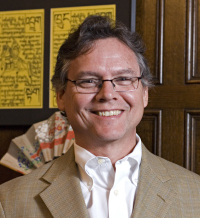 |
| Lee Barker |
Case 1: In Chicago, the board and president at Meadville Lombard Theological School realized that their financial model was not sustainable. Facing annual operating deficits, a relatively small unrestricted endowment and the current economic climate, they agreed that something bold needed to be done.
"We had known for some time, even before the 2008 financial meltdown, that we were not in a long-term financially sustainable situation," says Lee Barker, Meadville Lombard's president. They tried increasing enrollment, added an innovative new curriculum, and even explored a possible merger with Starr King School for the Ministry in California. "Yet we still found that financial sustainability was eluding us."
Case 2: In the Boston suburbs, the board and president at Andover Newton Theological School were facing financial challenges, but they were also thinking bigger. They had experience in holding joint classes and sponsoring joint programs with Hebrew College, their next-door neighbor in Newton Centre, Massachusetts, but Andover Newton's leaders weren't satisfied with a mere consolidation of freestanding schools. They wanted to create something that hadn't existed before — a multifaith theological university. Something bold needed to be done, they thought, to address the "unique and compelling challenges of our time."
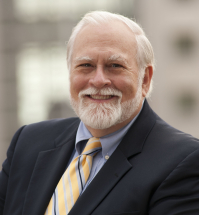 |
| Nick Carter |
With its history as the first graduate school in North America, the leadership at Andover Newton felt it was again time to be pioneers. "In our opinion, other than the Gospel itself, every one of the assumptions upon which theological education has been based in the past hundred years is being swept away," says Nick Carter, Andover Newton's president. "We found ourselves saying that we can't simply talk about merger. We need to have a bigger vision."
"The number one challenge of our time is religious difference," says Carter. "Seminaries have to prepare people secure in their own faith who can engage and work with people from different churches, religions, communities and nations. Who is preparing the next generation of spiritual leaders to have the border-crossing skills to help us through this?"
Both Meadville Lombard and Andover Newton were willing to explore collaboration. Andover Newton was already jointly affiliated with the American Baptist Churches and the United Church of Christ, and Meadville Lombard was Unitarian Universalist. Perhaps together they could create the kernel of that new theological university — one that would later welcome other institutional partners. One that would be genuinely interfaith, preparing men and women to minister in an interfaith world. And perhaps the new institution might establish a financial model more solid than that of either school alone while also fostering religious energy that couldn't be measured on a spreadsheet. Negotiations began in June 2010. Board committees were formed, meetings held, lawyers hired, financial statements shared. The hope was that the new theological university would begin operations in July 2011.
But in April 2011, the schools announced that their negotiations were ending.
Why not?
It wasn't for lack of good faith, trust, or transparency on the part of both institutions and their boards. Leaders from both schools credit the other institution with having the best of intentions and say they left the process with no hard feelings and respect for the other side.
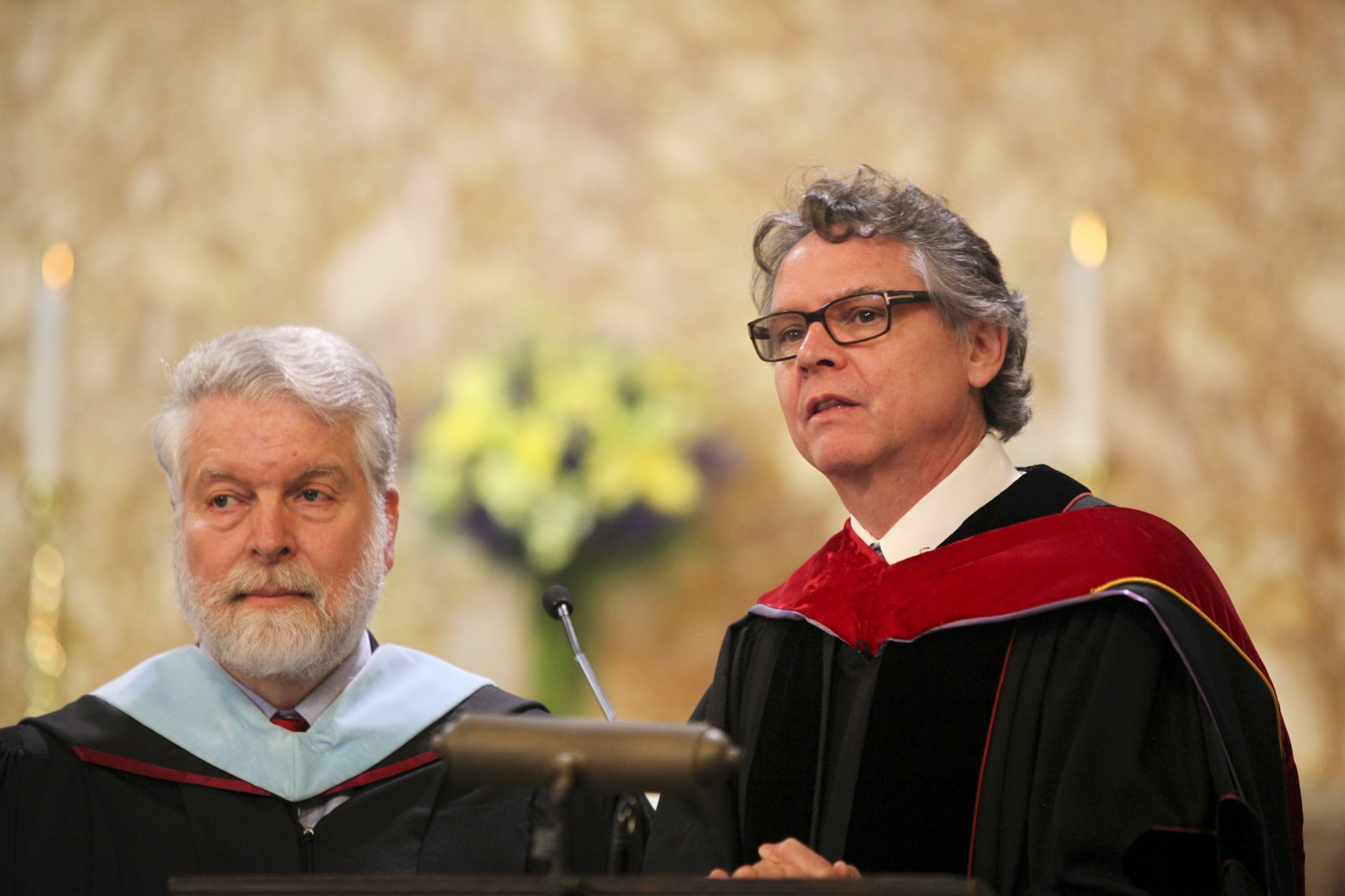 |
Board chair Larry Ladd (left) and president Lee Barker (right) represented Meadville Lombard Theological School in their partnership negotiations with Andover Newton Theological School.
Courtesy Meadville Lombard Theological School |
Yet successful consolidations between not-for-profit entities are rare, says Larry Ladd, chair of Meadville Lombard's board and director of the higher education practice at Grant Thorton LLP, a national accounting and management consulting firm.
"One of the parties needs to be under enormous financial strain and be convinced that their entity cannot continue in the present form," says Ladd. "Otherwise, mergers don't work. . . . They won't reach an agreement."
When they began negotiating with Andover Newton, the leaders at Meadville Lombard thought their institution was under this kind of dire strain, but the school's financial health changed over the course of that year, Barker and Ladd said.
"Finances were our original motivation, but when it got to decision time, they were no longer a motivation," says Ladd. "In fact, our finances were slightly less strong if we entered into the partnership. So as good trustees of the assets of the school, it was our jobs to say, ‘No, we can stand alone.'"
Contributing to that new financial health was a successful sale of Meadville Lombard's property, a slightly improved financial market and several large gifts totaling $4.6 million. "We began to solicit gifts that would ensure the mission of the school, regardless of whether the partnership went forward or we stayed on our own," Barker says. "We were very successful in receiving those gifts."
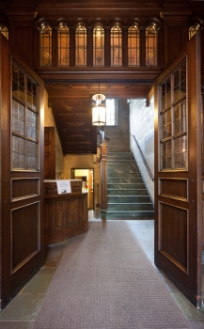 |
 |
| Above left is the formal entrance hall at Meadville Lombard Theological School's former building. On the right is their new home, the Spertus Institute in downtown Chicago. |
Andover Newton's leaders agree that finances were one of the main issues that prevented agreement. "Both schools soberly said, as part of the reason not to proceed, that we didn't see the finances working out," says Carter.
But more disciplined structure to the negotiations might have led to a deal, says David E. Smith, former chair of Andover Newton's board and a member of the transition committee for the proposed partnership, which was comprised of board members from both schools.
"There's a tendency to move slowly, but you have to figure out what it's going to take to operationalize something and get an agreement done. Sooner or later you have to get down to hard and firm decisions," says Smith, who works as a management consultant with organizations undergoing change, including mergers and acquisitions. "At the end of the day, the two sub-teams were not necessarily calibrated at the same level as to how far we could go."
Schools also struggle when it comes to the human element in negotiations. The tendency to want to carve out a role for individuals, rather than look at the broader picture, can hurt the potential deal, Smith says. "You have to bring it back to the best interests of the mission," he says. "Sometimes preserving what currently exists runs counter to that mission. It takes a lot to pull yourself out of the fray and say, ‘What's the best decision to make here?'"
Smith and Carter believe that financial considerations, while significant, take a back seat to questions of mission. And they think that institutions that have different levels of financial strength may not make the best institutional partners. "You can't have winners and losers," says Carter. "It would kill a deal for people to feel like they're being taken over. Even words like acquisition or merger are radioactive."
Another challenge that leaders at Andover Newton and Meadville Lombard faced was accreditation. "The nature of accreditation is that it's backward-looking," says Carter, the president of Andover Newton. "If you propose something that doesn't fit into any of the standards, the accrediting bodies are flummoxed. They don't know what to do with you."
The two seminaries are themselves the result of consolidations. Andover Theological Seminary (a Congregationalist school) and Newton Theological Institution (a Baptist seminary) formally merged in 1965 after sharing a campus for more than 30 years. Meadville Theological School moved from Pennsylvania to become part of the University of Chicago community in 1926; it eventually joined with Lombard College's Universalist Divinity School after the Great Depression.
Identity issues
Despite its out-of-state roots, Meadville Lombard considered its Chicago location part of its identity. "Even with the partnership, we were going to be in Chicago with our own facility," says Barker.
Other issues of identity and governance were lingering at the time of the decision not to move forward, says Smith, though Ladd said they had been "largely resolved, at least on paper." Among Meadville Lombard's criteria for an institutional partner was the ability to preserve its Unitarian Universalist identity. About 16 percent of Andover Newton's students are Unitarian Universalist.
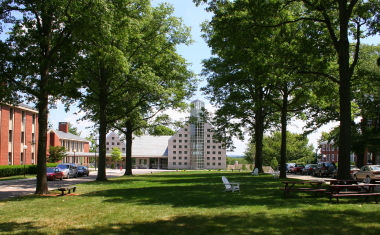 |
| Andover Newton Theological School’s chapel is at the center of campus, and its president, Nick Carter, envisions an interfaith future for the school. |
Identity is often non-negotiable, whether in partnership discussions or interfaith dialogue, says Carter. "We have a legacy that's incredibly important to us, and we feel responsible to the men and women on whose shoulders we stand to carry forward that legacy," he says.
But the "lowest common denominator" form of interfaith dialogue or partnership common among people of different faiths is not the answer, Carter says. "That's a good first step, but the real work begins when you can own up to and be confident in your difference. In committed pluralism, people can feel secure in their faith identity and not threatened that their legacies are being trampled in the midst of some takeover."
Governance, not surprisingly, was of concern to the schools' respective boards, although they readily came to agreement on some broad outlines. "That's actually one of the areas where I think both schools did a good job in agreeing to the fact that we didn't want to bring too much legacy with us," says Smith. "Neither board assumed they were going to have a role on the new board. We were starting with a clean slate."
Yet specifics about the board's makeup — as well as other governance issues — were left to be addressed later. "The questions around governance were around who made financial decisions for the institutions," says Barker. "We had not arrived at a point where we had figured that out." Negotiations ended before the planned governance discussions could take place.
One barrier to a successful partnership, ironically, is that until the full consolidation is accomplished, each respective board is still responsible for the survival of its own institution. So, once Meadville Lombard board members saw a better financial future without partnering, they were beholden to withdraw, Ladd and Barker say.
"It's important to remember while one is engaged in these conversations that the board of trustees does not lose its principle task, which is to protect the institution and ensure its sustainability," says Barker.
Barker and the board believe Meadville Lombard's new "Touchpoints" curriculum, which combines field work, on-campus intensive coursework, and online classes, is sustainable. Having sold its buildings, Meadville Lombard will lease space from the Spertus Institute, a center for Jewish studies in downtown Chicago. "This allows us to put our resources into mission instead of facilities," says Barker, adding that Meadville Lombard has a record-sized entering class this fall.
He has no regrets about the process. "The process itself helped us make some of the moves we had to make and really find our future," Barker says. "It didn't have the outcome that we hoped for, but it had outcomes that we couldn't see when we began, which we're really pleased about."
Meanwhile, Andover Newton has launched its own new competency-based curriculum and continues its discussions and negotiations with other possible partners for the new interfaith theological university."I really think the future of theological education is at stake," says Carter. "People are becoming aware of the urgency for change. If we don't take bold steps now, we may not be around to take them.
"Pondering a partnership? Tips from the trenches
1. Know why you want to join forces. "If you can't offer your constituency, your prospective students, and your donors a compelling idea, it probably won't work," says Nick Carter, president of Andover Newton Theological School. "Is the only reason for the partnership financial? Finances and the other executional pieces are all necessary, but they are rarely sufficient. The risk of focusing solely on finances and execution is that we become highly efficient, but increasingly irrelevant."
2. Take the time to get to know individuals and cultures involved. "Trust and transparency are primary," says Carter. "Negotiations depend a great deal on the time we've spent getting to know another."
3. Get professional assistance. It's overwhelming to run a seminary and conduct negotiations at the same time. Hire a professional facilitator and an attorney familiar with nonprofit law in the state in which the partnership will exist. You may have to fundraise or find grants to pay for the cost of the negotiations, says Carter.
4. Remember this is a board duty and decision. "Trustees need to play the lead role, because really they are the only ones who have the responsibility of the long-term mission and identity of the school, without in any way being compromised by their personal interests and careers," says Larry Ladd, chair of the board of Meadville Lombard Theological School.
5. Take the process very seriously. "You have to be prepared to look face to face with all the ghosts of faculty and donors from 100 years ago — they're all in the room with you," says Ladd. "You are talking about the core of your mission and identity. Those are the essential responsibilities of a trustee."
6. Create an objective structure for the process. "Decide what things need to be addressed to put the partnership together and define that structure up front," says David E. Smith, an Andover Newton board member involved in the negotiations. "Then you can look at whether you're making measurable progress that you can present to the full boards."
7. Agree to be disciplined when it comes to difficult decisions. Religious institutions have a tendency to be "nice" when it comes to difficult decisions that may affect individuals. "That's not a good thing in this type of situation," says Smith. "Failure to be more disciplined compromises the model you're building."
8. To the extent that it is possible, avoid an "us versus them" attitude. Both sides agree that members of both schools' leadership did this, yet in the end, they each had to go back to their own boards for final approval. "In the conversations between Andover Newton and Meadville Lombard, each institution showed great sensitivity to the needs of the other," says Lee Barker, president of Meadville Lombard. "But no institution will or should be expected to relinquish its own decision-making ability and power. Trustees are not going to change their perspective on what their job is until the final outcome is known and acted upon."